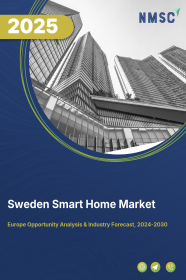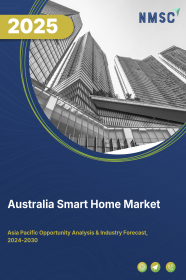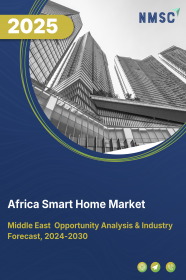
Sweden Smart Home Market by Product Type (Smart Lighting, Smart Home Security & Surveillance, Smart Entertainment, and Smart Appliances), by Communication Protocol (Wi-Fi, Zigbee, Z-Wave, Bluetooth, and Thread), by Smart Home Hubs (Standalone Hubs and Built-in Hubs), by Voice Assistants Integration (Amazon Alexa, Google Assistant, Apple Siri, and Others) – Opportunity Analysis and Industry Forecast, 2024–2030
Industry: Retail and Consumer | Publish Date: 15-Feb-2025 | No of Pages: 140 | No. of Tables: 104 | No. of Figures: 69 | Format: PDF | Report Code : RC2282
US Tariff Impact on Sweden Smart Home Market
Trump Tariffs Are Reshaping Global Business
Sweden Smart Home Market Overview
The Sweden Smart Home Market size was valued at USD 781.0 million in 2023, and is predicted to reach USD 3406.7 million by 2030, at a CAGR of 23.4% from 2024 to 2030. A smart home, alternatively referred to as a connected home, denotes a dwelling outfitted with state-of-the-art technology and automation systems enabling centralized control and monitoring of diverse household devices, appliances, and security features through a centralized network. These intelligent devices can be remotely managed and frequently respond to voice commands or predetermined schedules, enhancing homeowners' convenience, energy efficiency, and security. Typical components found in connected homes encompass smart thermostats, lighting systems, security cameras, voice assistants, and other interconnected devices crafted to elevate the overall quality of life.
Rapid Urbanization Drives the Growth of the Sweden Smart Home Market Trends
Sweden's remarkable urbanization status positions it as a global leader, significantly influencing the demand for robotic vacuum cleaners nationwide. With an urban population of 88.7% in 2023 and an annual growth rate of 0.89%, Sweden's extensive urbanization fuels a substantial increase in the need for robotic vacuum cleaners. As urban living becomes more prevalent, there is a growing demand for convenient and time-saving home solutions, such as connected homes. These intelligent devices, including robotic vacuum cleaners, gained traction in Swedish households, providing an efficient means to maintain cleanliness amidst bustling urban lifestyles. Sweden's rapid urbanization serves as a primary driver behind the burgeoning connected home market in the country.
Higher Disposable Income is Boosting the Market Growth
Sweden's higher disposable income significantly contributes to the growth of the smart home market within the nation. With the average household's net-adjusted disposable income per capita standing at USD 33,730 annually, surpassing the OECD average, Swedish consumers possess greater purchasing power to invest in smart technologies, including connected home products. This increased financial capacity enables consumers to prioritize convenience and efficiency, making connected homes an attractive option to enhance their quality of life. Consequently, the demand for connected home devices surges in the Swedish market, driving their growth and adoption.
Concerns Regarding Security and Data Privacy Obstacles the Market Expansion
The growth of the smart home market encounters a significant obstacle due to apprehensions surrounding the security of interconnected systems. Smart devices such as thermostats, cameras, and door locks face susceptibility to hacking, posing potential threats to residents' privacy and safety. This vulnerability often originates from weak or easily penetrable passwords and insufficient Wi-Fi network security measures. Exploiting these weaknesses, hackers can gain unauthorized access, potentially assuming control of devices or obtaining sensitive data.
To address these risks, prudent homeowners must prioritize stringent password protocols, routinely update device firmware, and fortify their home networks to diminish the risk of cyber intrusions and safeguard their connected homes from potential breaches.
Integration of Blockchain Technology into Smart Home Devices Presents Lucrative Opportunity for Market Expansion
Blockchain technology, renowned for its robust security and transparency features, presents significant potential to enhance the security and privacy of connected home systems. By encrypting and securely storing sensitive smart home data, blockchain grants users control over who can access their information, thereby minimizing the risk of unauthorized intrusion. Additionally, blockchain verifies device identities, ensuring that only trusted devices interact within the connected home network, while also automating tasks through tamper-proof smart contracts.
Furthermore, blockchain technology decentralizes device control, thereby reducing vulnerabilities and facilitating transparent access control and permissions management. The integration of blockchain into smart homes not only enhances security and privacy but also fosters a safer and more confidential connected home environment. Consequently, it is poised to create numerous growth opportunities for the Sweden smart home market.
Competitive Landscape
Several market players operating in the Sweden smart home industry include Schneider Electric, ABB Ltd, Amazon, Shelly, Samsung, LG Electronics, Google Home, Somfy, D-Link Systems, Inc., Snap One, LLC.
Sweden Smart Home Market Key Segments
By Product Type
-
Smart Lighting
-
Smart Bulbs
-
Smart Light Strips
-
Smart Switches
-
-
Smart Home Security and Surveillance
-
Smart Cameras
-
Video Doorbells
-
Smart Locks
-
Security System
-
-
Smart Entertainment
-
Smart TVs
-
Smart Speakers
-
Streaming Devices
-
-
Smart Appliances
-
Smart Refrigerators
-
Smart Ovens
-
Smart Washing Machines
-
Smart Dishwashers
-
Smart Home HVAC Management
-
Other Smart Appliances
-
By Communication Protocol
-
Wi-Fi
-
Zigbee
-
Z-wave
-
Bluetooth
-
Thread
By Smart Home Hubs
-
Standalone Hubs
-
Built-in Hubs
By Voice Assistants Integration
-
Amazon Alexa
-
Google Assistant
-
Apple Siri
-
Others
By Smart Home Compatibility with Smartphones
-
iOS
-
Android
By Installation
-
DIY Installation
-
Professional Installation
By Sales Channel
-
Online Retailers
-
Retailers
REPORT SCOPE AND SEGMENTATION:
|
Parameters |
Details |
|
Market Size in 2023 |
USD 781.0 Million |
|
Revenue Forecast in 2030 |
USD 3406.7 Million |
|
Growth Rate |
CAGR of 23.4% from 2024 to 2030 |
|
Analysis Period |
2023–2030 |
|
Base Year Considered |
2023 |
|
Forecast Period |
2024–2030 |
|
Market Size Estimation |
Million (USD) |
|
Growth Factors |
|
|
Companies Profiled |
10 |
|
Market Share |
Available for 10 companies |
|
Customization Scope |
Free customization (equivalent up to 80 working hours of analysts) after purchase. Addition or alteration to country, regional, and segment scope. |
|
Pricing and Purchase Options |
Avail customized purchase options to meet your exact research needs. |
KEY PLAYERS
-
Schneider Electric
-
ABB Ltd
-
Amazon
-
Shelly
-
Samsung
-
LG Electronics
-
Google Home
-
Somfy
-
D-Link Systems, Inc.
-
Snap One, LLC.

















 Speak to Our Analyst
Speak to Our Analyst




















